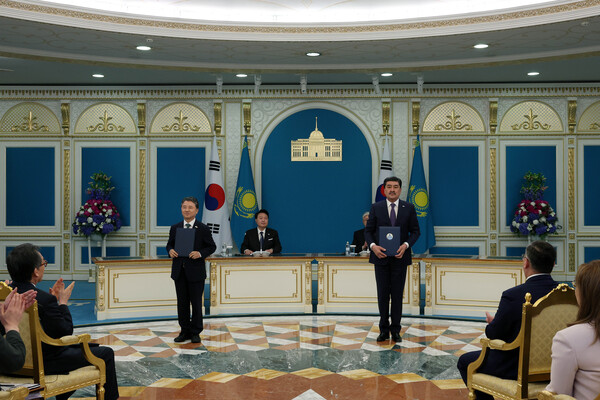
Kazakhstan has experienced devastating forest fires, with damage amounting to 100,000 hectares from 2022 to 2023, underscoring the urgent need for international cooperation in forest disaster response. In a significant move to address this crisis, the Korea Forest Service announced on June 12 (local time) that Nam Seong-hyun, Chief of the Korea Forest Service, and Yerlan Nyssanbayev, Minister of Ecology and Natural Resources of Kazakhstan, signed a memorandum of understanding (MOU) on forest cooperation. The signing ceremony took place at the Kazakh presidential palace in Astana, in the presence of the leaders of both countries.
The Korea Forest Service has a history of establishing bilateral cooperation relationships with 39 countries and has been actively engaged in various cooperative activities with Kazakhstan since the Korea-Central Asia Cooperation Forum in 2013. Notable projects include the 'Aral Sea Forest Restoration Project' and the 'Friendship Forest Creation.' This new MOU aims to expand the areas of forest cooperation to include forest fire prevention, response, and the restoration of damaged areas. Additionally, the agreement seeks to strengthen exchanges between research institutions in areas such as seed cooperation for biodiversity enhancement, arboretums, and forest satellite imagery and interpretation technology.
Yerlan Nyssanbayev, Minister of Ecology and Natural Resources, expressed optimism about the future of this collaboration, stating, "I hope that the forest cooperation, which has been solidly built on the trust between the two countries, will be further strengthened through this MOU." His sentiments were echoed by Nam Seong-hyun, Chief of the Korea Forest Service, who said, "We will expand the exchange of forest policies between the two countries, including forest disaster response and biodiversity enhancement." He added, "We expect that close forest cooperation between Korea and Kazakhstan will lay the foundation for mutual prosperity."
Kazakhstan's ecological challenges, particularly the large-scale forest fires, have highlighted the need for effective forest management and international assistance. The Korea Forest Service's decision to expand cooperation reflects the Kazakh government's request for support in forest fire prevention and response. This collaboration is expected to leverage advanced technologies and expertise, including the use of satellite imagery for monitoring and assessing forest conditions, which is crucial for effective forest management and disaster response.
The historical context of Korea-Kazakhstan relations, marked by ongoing collaborative efforts since 2013, provides a strong foundation for this expanded cooperation. The presence of leaders from both countries at the signing ceremony underscores the diplomatic importance of the agreement and the commitment to addressing ecological challenges through international partnerships.
As the world faces increasing environmental challenges, this MOU between Korea and Kazakhstan represents a significant step towards global environmental cooperation. The exchange of knowledge, technology, and resources between the two countries is expected to enhance forest management, biodiversity, and disaster response capabilities, ultimately contributing to the restoration and preservation of Kazakhstan's forests.
The current status of the agreement marks the beginning of an expanded partnership, with both countries committed to implementing the agreed-upon initiatives. Future developments are anticipated as the Korea Forest Service and Kazakhstan's Ministry of Ecology and Natural Resources work together to achieve their shared goals of forest conservation and ecological restoration.


